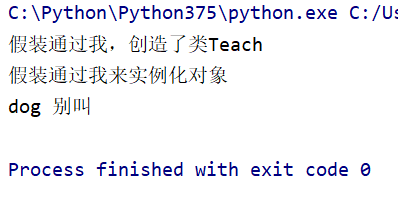In memory of the more than 300 thousand Chinese murdered
exec( 字符类型的代码,全局变量,局部变量 )。其中,全局变量和局部变量可以写成字典形式进行赋值。
举例:
'''
字符串
exec(字符串,全局变量、局部变量)
'''
x = 10
expr = """
z = 30
sum = x + y + z
print(sum)
"""
def func():
y = 20
exec(expr)
exec(expr, {'x': 1, 'y': 2})
exec(expr, {'x': 1, 'y': 2}, {'y': 3, 'z': 4})
func()
exec关于局部名称空间和全局名称空间的关系,请参照以下例子: exec( 字符串格式是语句,全局名称空间,局部名称空间)
# _*_ coding: gbk _*_
# @Author: Wonder
x = 10
expr = """
z = 30
y = 5
global x
x = 18
m =10
print('x',x)
print('z',z)
sum = x + y + z
print(sum)
"""
func1 = {'x': 1, 'y': 2}
func2 = {'x': 3, 'y': 4}
func3 = {'x': 99, 'y': 99}
def func():
y = 20
x = 11
exec(expr)
exec(expr, func1, func2)
exec(expr, func3, func1)
print(func1, '
')
print(func2, '
')
print(func3)
func()
元类
元类是类的类,普通类是元类type的实例化对象,元类:type以及继承了type的类称为元类
元类实例化------>类,类实例化------>对象。
# _*_ coding: gbk _*_
# @Author: Wonder
# 正常调用类
class Teach:
def __init__(self, name, age):
self.name = name
self.age = age
@property
def bark(self):
print('%s 别叫' % self.name)
obj = Teach('dog', 18)
print(obj)
print(obj.name)
obj.bark
# 通过元类,生成类。type的三要素(class_name,class_bases, class_dict)
class_dict = {}
exec('''
def __init__(self, name, age):
self.name = name
self.age = age
@property
def bark(self):
print('%s 别叫' % self.name)
''', globals(), class_dict)
Teach2 = type('Teach', (object,), class_dict)
obj1 = Teach2('horse', 17)
print(obj1)
print(obj1.name)
obj1.bark
执行的结果如下:---->证明(两种方式都可以生成类)

定制元类,进行控制类的创建行为
# _*_ coding: gbk _*_
# @Author: Wonder
class Mymeta(type):
def __init__(self, class_name, class_bases, class_dict):
'''
此处可以对类名,类局部名称空间中的一些参数进行条件控制
:param class_name:
:param class_bases:
:param class_dict:
'''
print('假装通过我,创造了类Teach')
super().__init__(class_name, class_bases, class_dict)
# 正常调用类
class Teach(object, metaclass=Mymeta): # Mymeta(class_name,class_bases,class_dict)
def __init__(self, name, age):
self.name = name
self.age = age
@property
def bark(self):
print('%s 别叫' % self.name)
obj = Teach('dog', 18)
obj.bark
需要注意的是,一定要写super().__init__(class_name, class_bases, class_dict) ,重用type生成类的功能
执行结果如下图,

定制元类,进行控制类的实例化行为
# _*_ coding: gbk _*_
# @Author: Wonder
class Mymeta(type):
def __init__(self, class_name, class_bases, class_dict):
print('假装通过我,创造了类Teach')
super().__init__(class_name, class_bases, class_dict)
def __call__(self, *args, **kwargs): # 调用类,都会先触发__call__, 实例化的三部曲
# 1、造一个空对象
obj = object.__new__(self)
# 2、初始化对象
self.__init__(obj, *args, **kwargs)
# 3、返回一个对象
print('假装通过我来实例化对象')
return obj
# 正常调用类
class Teach(object, metaclass=Mymeta): # Mymeta(class_name,class_bases,class_dict)
def __init__(self, name, age):
self.name = name
self.age = age
@property
def bark(self):
print('%s 别叫' % self.name)
obj = Teach('dog', 18)
obj.bark
调用类,会触发__call__;用object.__new__ 造一个空对象 ;初始化对象时,空对象作为第一个参数传入__init__。
以上代码执行结果如下:
